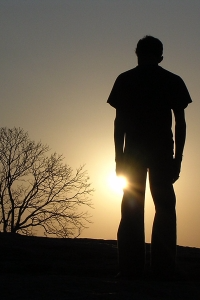
Just a quick note to make before reading this, this story was a dystopian short story that I wrote for an assignment.
There I was, moments away from my demise. But how had I got here? What had I done that had angered the government so profusely that they had put me on stage for the most unbearable and painful public execution? I recalled my actions, pondering why I was on the stage. As far as I knew, I had done nothing wrong, but regardless, with my last breaths being taken, I recounted the last few weeks of my life.
The propaganda poster blew down the dusty, deserted road like a tumbleweed in the powerful Texas wind, reemphasizing the fact that I was living in the worst state possible. However, this was not Texas: not everyone was privileged enough to live in the wealthy, ideal state of Texas, I thought to myself as I continued down the alley way, shaded by the thick layer of gloomy storm clouds. I kicked the corroded trash can, creating a loud echo. The crows separated with a deafening “caw,” as a reaction to my force of frustration taken out on the poor dumpster. My name is Joseph. Before the election, I was your stereotypical tradie; I owned a plumbing business, I had a family, and my life was relatively normal. However, those are far from my circumstances presently. I sacrificed all I had to evacuate my wife and child from Kentucky to Texas, before Kentucky became overruled by racist extremists. Even though that meant I stayed behind. A decade ago, the thought of divided states with separate laws was absurd, but that absurdity had now become an illogical reality. Some of the major laws that differed from prior to the election were quite apparent in Kentucky’s society now. The African-American people had become slaves again, Native Americans were forced to hunt for food, and freedom both mentally and physically, was restricted. Those were just a few of the laws changed by the new government. The fact that these degenerates had not been overruled by the rest of the allied powers was still a foreign concept to my mind.
As I creaked open the door to what was left of my home, I heard the drip of my broken tap,
making a distinct ‘plink’ as the droplet collided with the rusted sink. At first, the sound of
the tap was almost meditative, but the constant ring created by the droplets became
somewhat of an irritation quite quickly. Though, I cannot be annoyed with the tap. After all,
it is the closest sound I can get to music after the government banned it due to its
popularity in the separate states. Sometimes I can even appreciate the bird calls, or the cats
meowing, or even the raspy barks of the stray dogs running rampant throughout the
streets. Every breath I took, a sharp cough followed. The pollution in Kentucky was nothing
like it used to be with the nice blue grass.
I fell onto my couch like a ragdoll, lifeless. I hadn’t eaten in days. My normal route that I took for scavenging had been blocked off by a thick, cement wall. The streets were laced with cameras, making it difficult to get through without being caught by the government and publically executed. I pondered the possibility of escaping; was it even a possibility? My mind flooded with ideas. Why had I delayed the inevitable for so long? I knew that I would have to leave eventually, but procrastinating further was only creating a smaller opportunity for escape. I had to devise a plan that avoided me getting caught, but led me to the feeling of freedom I so deeply yearned for.
I began to create a map of the city, paying close attention to the locations of the cameras and the possible exits out of the state. There were limited exits to begin with, but as time flew by, there became even fewer. By the time I had created the map, there was only one possible exit left, heavily guarded by army personnel. There was no possible exit out of the state remaining. My gap had closed.
I sat in frustration with my head in my hands. Angry at myself that I had not planned ahead, but sympathetic for my family. Would they be able to sustain themselves? Being an optimist, I decided that it was not time to give up on my family, after revisiting my map, I noticed I had checked the sewers, the streets and the tunnels, but a major component of my map that I had excluded was the subway.
The subway stations were the most common form of transport before the separation of states. Since then, the homeless people who had begged there previously, had formed a resistance in the subway. To join this resistance, you needed to pay a hefty price, whether that be food or materialistic possessions. I had inherited a large portion of my family’s wealth prior to the election, however, in this world food was worth more than diamonds. Food was a necessity; diamonds were just a materialistic possession. To the homeless, diamonds did not matter prior to the election, and that had not changed.
I approached the subway with great caution and curiosity. What was The Resistance? There sure hadn’t been anyone making an effort to resist as of yet. As soon as I reached the subway, I was surrounded by what seemed to look like guards from the government, but there was a very distinct difference. If these soldiers were a part of the government, I would already be either dead or on my way to being publically executed. These soldiers had a noticeably different badge; the same as a government badge, except a clear red line diagonally bisecting the image. Their uniforms were identical and their weaponry as well. These soldiers in the subway hadn’t been noticed because they were easily mistakable for a government soldier.
We entered the subway down a dim-lit stairway. A foul odour filled the air as we entered, but as we approached the area where the resistance dwelled, the odour began to dissipate, replaced with a welcoming aroma. The smell reminded me of my wife’s cooking, filling my nostrils with a fresh scent of herbs and spices. The subway was also surprisingly warm, with Mozart playing in the background. A sense of calmness occupied my body. I felt at peace; at home; safe.
As we arrived our destination, I caught a glimpse of the subway in its entirety. The resistance had transformed the disgusting, vandalised, littered subway into a small village. Some houses appeared to have chimneys, and the smell of pine branches mixed with the sweet fragrance from fresh muffins, bringing forth welcome flashbacks of our cottage in the woods of Alaska. After losing track of the present, I was nudged by a soldier indicating that we needed to keep moving.
We travelled through the subway, passing by different huts; stores of some sort. The stalls were filled with different necessities: food, water, medicine, clothes and more. All had price tags on them, but not in dollars. This seemed to be a completely foreign currency. The currency of the resistance? I speculated.
As we approached seemingly the richest district, judging by the distinguishable increase in quality of the huts, we reached our destination which looked to be the room where the leaders of the resistance situated, based in the transformed male bathroom of the subway. As we entered, even the soldiers appeared to be entering the room with caution.
Behind the door sat twelve leaders at a table. Were these the people who decided my fate? I wondered. Would they let me in, or did they have the same policy as the government in Kentucky? I began to recognise the people sat at the tables as government officials from the other states. Were the Resistance cooperating with the government?
I looked for the leader of Texas, John Smith, however, he was nowhere to be seen.
I spoke with desperation, “I need to get to Texas.” The expressions on the government officials did not change, nor did they speak.
I repeated myself, “I need to get to Texas.” Once again, the expressions did not change.
A guard whispered to me with a serious tone, “Quiet.”
The expressions on their face appeared as if they were analysing me, deciding whether I was a threat or not, recording observations in small notebooks.
After a suspenseful wait, one leader finally spoke. I recognised her as Mary Jones, the first female leader in the United States. She was elected as President of Oklahoma during the election which divided the states. She questioned me, “Name?”
“Joseph,” I responded.
“Age?”
“34.”
“Occupation?”
“I used to own a plumbing business.”
“Well, Joseph. When is the last time you had a proper meal?” It took me a moment to think. When was the last time I had a meal? I hadn’t eaten in 3 days, but a proper meal had been out of reach for multiple years now. “Since the election.” I estimated. The politicians debated amongst themselves for a few minutes, queuing my turn to be silent. When they had come to an agreement, another leader spoke, this one I did not recognise, “Well, let’s get you fed and dressed and we will speak about getting you to Texas.”
We spoke for roughly ten minutes until a group of Resistance members brought in some food and we ate in silence. A sense of uncertainty entered my body as they entered the room with the freshly prepared meal, something did not seem quite right. As if this was a set up. I thought it was the lack of food getting to me, so I decided to eat my food before I made any irrational decisions. Besides, I was outnumbered and unarmed, I could not risk making any sudden moves that made them suspicious.
We finished the meal after thirty minutes of eating, my stomach was full and I decided that I would relax for as long as possible. They nodded their heads and exited the room, leaving the room silent apart from the rustling feet outside the door, and the quiet whispers of the politicians. I sat in silence for what seemed to be hours? Suddenly the door sprung open. Soldiers entered the room like a swarm of bees, approaching in formation with the accuracy of an assassin. Why were they crowding around me with such caution? It was then I noticed something unusual about the uniforms, the logo had no red line through it they were not The Resistance.
The Kentucky soldiers lifted me from the seat and handcuffed me, I ignored their irrelevant speech about my rights, I knew my fate was sealed. Exiting the subway via the staircase, the same way I arrived. I felt betrayed, filled with anger. I had been used as a scapegoat by The Resistance. As we approached the government’s car, I knew my demise was inevitable. And the punishment for attempted escape was a terrible, gruesome public execution.
It was decided upon that I shall be executed the old fashion way: beheading. Such a medieval and savage form of execution, but I was in no position to oppose their decision. I refused to speak and eat, hoping that I died of starvation before I was beheaded in public. However, I knew that by the time I had died of starvation, it would have taken days, more likely to die of thirst before hunger. The president of Kentucky approached my cell, as he did with all people being executed as a form of torment. “Hello, Joseph.”
His speech startled me at first. How did he know my name? I knew there were cameras outside my house but at no time had I mentioned my name, nor had anyone else. This indicated that I was under surveillance even before the election. The President kneeled down to the height at which I sat, some form of demeaning or condescending behaviour in the hopes that I’d break. But I wouldn’t break. I had no information to spill and telling them that I was innocent would only hasten the process of execution. “Today’s your day, Joseph!” Never mind, I thought.
I was loaded into the back of the dirty paddy wagon along with two other prisoners. “What did you do?” One of them asked. He was tall, very tall and extremely masculine. The majority of his body shaded by tattoos. “Nothing.” I replied. Both of them shook their heads, not in disbelief but pity. I could tell by the expressions on their face that they too had done a petty crime, not one deserving of execution; or not in the old world at least.
As we neared our execution, my stomach hit bedrock. I did not want to die, not in such a savage manner. I dreamed of living old my entire life and now I was set to die in my early forties. The doors to the car opened, and I shook vigorously as I was led to the stage which I was destined to die upon. I was locked into the pillory and I knew my final breaths were about to be taken.
As the executioner prepared the axe to separate my head, I heard a faint shout. The shout of a bidder? No one bid for criminals unless they knew the prisoner personally or saw significant use in the person as a slave. The hope of the bidder brought me to my senses, I looked up and glanced at the bidder. My wife and child staring at me in desperation, their clothes well-ironed and even had make-up on. But they were too late, the executioner had finished sharpening his axe and the command was not called off.
My final thoughts were of my family, and the hope that they would be safe after my death. But more importantly, reminiscing on the times we had together. I had no regrets for what I had done for my family, I only hoped they felt the same. And as the axe came down, I felt a sensation of completion, that I had done everything in my power to help my family and that I had created the most positive environment possible for a family to live in.
And then, black. Nothing but darkness. Is this death? Quite peaceful, the faint sound of birds chirping in the background. My mind was calm and peaceful, reassurance filled my soul that my family would recover after my death. Of course, they would mourn for me, they would blame themselves for my death; that they had not stayed behind with me. But eventually they would come to understand that I would forgive them and then they can forgive themselves. And as I began to rest, I listened blissfully to the melodic chirps of the birds.
About the Author



Comments